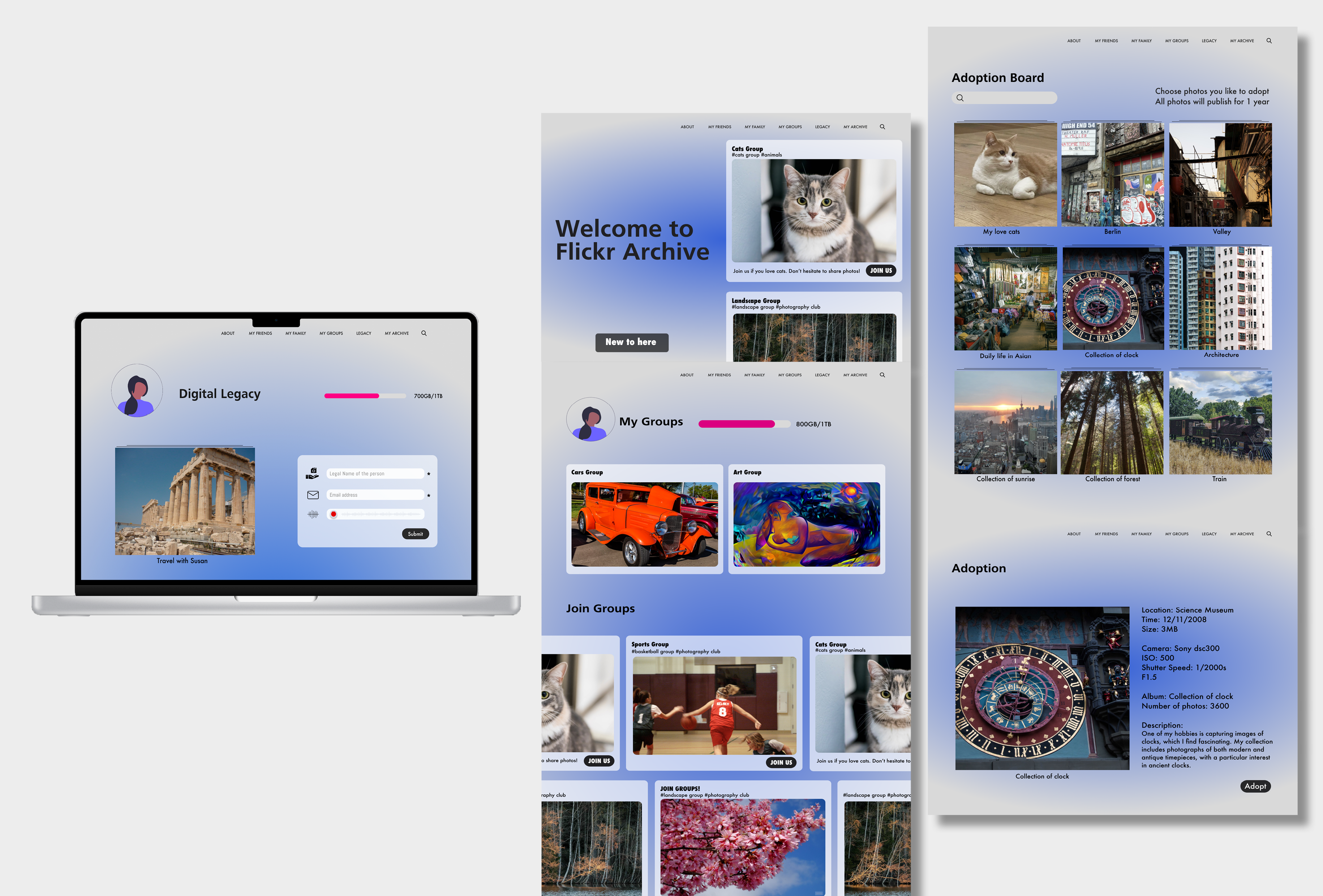#Website Design
#UI & UX


This project addresses the Flickr Foundation's goal to protect users' photos on Flickr for a century.
Our research revealed that personal micro-archives, passed down through generations, are the most effective way to ensure these resources remain safe and accessible. Consequently, we proposed the concept of a digital legacy. We also identified that the current centralized network poses a risk, as it allows institutions and powerful individuals to potentially destroy digital property. To better safeguard users' digital memories, we developed a prototype platform utilizing a peer-to-peer network.
Flickr基金会项目,项目目标是在一个世纪内保护用户在Flickr上的照片。
通过调研,我们发现代代相传的个人微档案是确保这些资源保持安全和可访问的最有效方式。因此,我们提出了数字遗产的概念。我们还发现,当前的中心化网络存在风险,因为它允许机构和强大的个人潜在地破坏数字财产。为了更好地保护用户的数字记忆,我们开发了一个利用点对点网络的原型平台。
Our research revealed that personal micro-archives, passed down through generations, are the most effective way to ensure these resources remain safe and accessible. Consequently, we proposed the concept of a digital legacy. We also identified that the current centralized network poses a risk, as it allows institutions and powerful individuals to potentially destroy digital property. To better safeguard users' digital memories, we developed a prototype platform utilizing a peer-to-peer network.
Flickr基金会项目,项目目标是在一个世纪内保护用户在Flickr上的照片。
通过调研,我们发现代代相传的个人微档案是确保这些资源保持安全和可访问的最有效方式。因此,我们提出了数字遗产的概念。我们还发现,当前的中心化网络存在风险,因为它允许机构和强大的个人潜在地破坏数字财产。为了更好地保护用户的数字记忆,我们开发了一个利用点对点网络的原型平台。
Later, I developed further to build an independent platform, named Digital Legacy Cabinet.
The Digital Legacy Cabinet website offers a service for individuals to manage and transfer their digital legacy to their chosen heirs. The website collaborates with popular social media platforms such as Flickr, Instagram, Facebook, WeChat, etc. It allows people to manage the account including content and photos they have shared on these platforms to be inherited or closed after the passing away.
后来,我进一步开发,建立了一个独立的平台,命名为“数字遗产柜”。
“数字遗产柜” 网站为个人提供了一项服务,可以管理他们的数字遗产,并将其转移给他们选择的继承人。该网站与流行的社交媒体平台合作,如Flickr, Instagram, Facebook,微信等。它允许人们管理账户,包括他们在这些平台上分享的内容和照片,以便在去世后继承或关闭。
The Digital Legacy Cabinet website offers a service for individuals to manage and transfer their digital legacy to their chosen heirs. The website collaborates with popular social media platforms such as Flickr, Instagram, Facebook, WeChat, etc. It allows people to manage the account including content and photos they have shared on these platforms to be inherited or closed after the passing away.
后来,我进一步开发,建立了一个独立的平台,命名为“数字遗产柜”。
“数字遗产柜” 网站为个人提供了一项服务,可以管理他们的数字遗产,并将其转移给他们选择的继承人。该网站与流行的社交媒体平台合作,如Flickr, Instagram, Facebook,微信等。它允许人们管理账户,包括他们在这些平台上分享的内容和照片,以便在去世后继承或关闭。